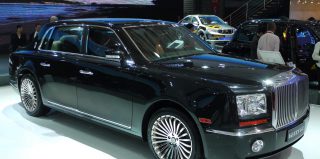Woman dies in 20-car pile-up on A40 as cold weather alert issued A acute drop in temperatures has prompted Public Health England to send outs its most serious cold weather alert of the winter so far, warning conditions are severe enough to endanger the elderly. Forecasters have also issued a severe weather warning as the […]
Take the smartest route to buying a fresh car
Sales are flourishing with Two.26 million fresh car registrations in two thousand thirteen [GETTY]
Sales are flourishing, with Two.26 million fresh car registrations in 2013, up more than ten per cent on 2012, according to fresh figures from the Society of Motor Manufacturers and Traders.
The surge has partly been driven by the growth of PCP, with the number of plans up fifty per cent across the fresh and used car markets in the year to August 2013, according to the Finance & Leasing Association.
With PCP you don`t actually buy the car at the outset. Instead you put down a deposit, typically ten per cent of the price, then pay a regular monthly amount for inbetween one and three years. After that, you can either come back the keys to the finance company or make a final «balloon» payment to make the car yours.
The attraction of PCP is that it puts you behind the wheel of a brand fresh car for a lower initial cost than buying it outright, says Graham Hill, vehicle finance director at the National Association of Commercial Finance Brokers (NACFB).
«PCP can substantially reduce the monthly payments on a fresh or used car, which are typically much lower than on a individual loan or HP.
«If you mitt the car back when the agreement expires, there is nothing more to pay.»
PCP can substantially reduce the monthly payments on a fresh or used car, which are typically much lower than on a individual loan or HP
When your contract finishes you have three choices, says Richard Weller at Honda Finance Europe.
«Very first, you can pay a pre-agreed price for the vehicle, known as the assured minimum future value, which means you own it outright.
Or you can come back the car and walk away without paying any more.
«Eventually, you can also part-exchange it, using its remaining value as a deposit on another PCP.»
The final option means you can trade up to the latest model every few years and never go to the expense of actually buying it, Weller says.
«However, if you are blessed to keep the same car for five years or more, then buying the car outright through HP may still be a better option.»
PCP gives you more protection than if you buy with a individual loan or cash, says Graham Hill at NACFB.
«You are covered by Section seventy five of the Consumer Credit Act, which means the finance company and dealer are identically liable for any problems you have with the car.»
How much you pay each month under PCP depends on the value of the car [GETTY]
How much you pay each month under PCP depends on the value of the car, how long you plan to keep it, your likely mileage over the contract and the car`s final value, says Lucy Burnford, founder of car finance website Motoriety.co.uk.
«You know exactly what the car will cost you every month for as long as you keep it. You can even bolt on a maintenance package.»
But there are potential downsides to PCP, says Phill Jones, commercial director of Motors.co.uk. «You never actually own the vehicle so at the end of the contract you don`t have an asset to sell.
«And if you palm the car back you will be charged if you have exceeded your agreed mileage or there is any harm to the vehicle.»
Roger Powell at consumer vehicle data provider MyCarCheck.com says the finance company retains legal ownership of the vehicle.
He says: «Many motorists wrongly presume they are free to sell the vehicle on so long as they keep up the monthly payments. This is illegal as the car isn`t yours to sell.»
If you determine against keeping the car your payments won`t have been invested in acquiring an asset, they`ll simply be gone, says Floyd Timms, managing director at Lodge Mazda.
«While PCP does suggest the facility to own the vehicle outright at the end of the agreement most people choose to roll the equity they have built into a newer car.»
If values fall significantly over the contract term, you will have less equity to roll over into your next PCP contract, warns Carl Virgo, head of consumer finance at Raphaels Bank.
He says: «If you do want to keep the car, you must budget for that final balloon payment. Too many people fail to do so.»
Related articles
Hire purchase (HP) is still a popular form of dealer finance, Virgo says. «It is a familiar product, typically used to buy a used vehicle.
«It means that you own the vehicle outright once the finance has been finished.»
As with PCP, you have protection under Section seventy five of the Consumer Credit Act.
With HP, you don`t actually own the car until you
have made the final repayment so it could be seized if you fall behind.
Don`t just take the finance suggested by your local dealership, compare the market instead, says Louis Rix, director of Carfinance247.co.uk.
«Often dealerships add in their own cut on top of their finance package, which you will pay for in a higher borrowing rate.»
Individual loans remain a popular way to fund a car purchase and are used by one in three motorists, says Simon Ranson, at Sainsbury`s Bank.
«They give you regular monthly payments to suit your budget and effectively turn you into a cash buyer, putting you in a strong bargaining position. You are free to buy any car you like from any seller.»
Private loan rates have fallen to all-time lows. Sainsbury`s Bank, for example, charges just Four.6 per cent on loans inbetween £7,500 and £15,000, repaid over three years.
MoneySupermarket.com has just launched an sensational with the AA for the same amount at Four.6 per cent over five years but it is only available until next Monday.
Don`t just go to your bank but shop around and compare individual loan rates online, using sites such as Carfinance247, Confused.com, Carloan4u.co.uk, Financeacar.co.uk, and Moneysupermarket.com.
David Black, banking specialist at Consumer Intelligence, says individual loan rates have plunged due to intense competition.
«The best unsecured loan rates tend to be for loans of inbetween £7,500 and £15,000, with rates embarking wellunder five per c ent . Loans from £Five,000 up to £7,499 cost slightly more and loans below £Five,000 are much higher.»
If you`re borrowing, say, £Four,500 over three years, rates embark at about eight per cent and can hit dual figures.
The best headline rates are now reserved for borrowers with excel lent credit ratings. «If you have had past financial problems then you could pay a lot more,» Black warns.



